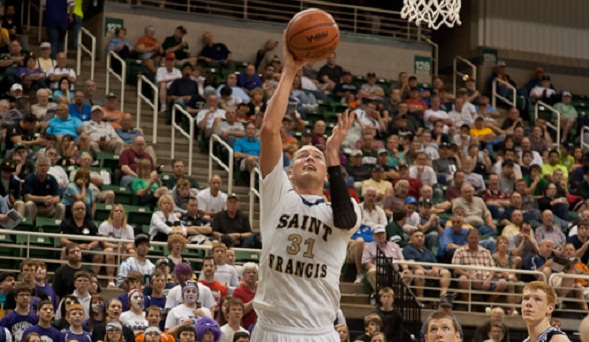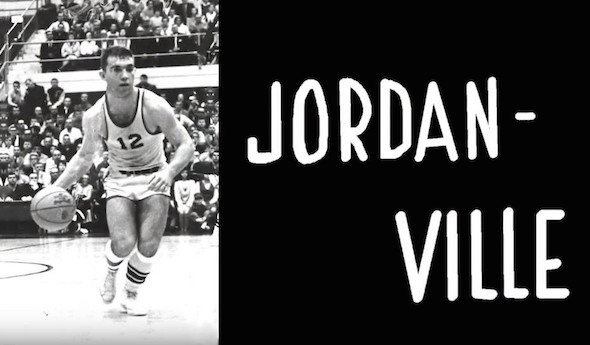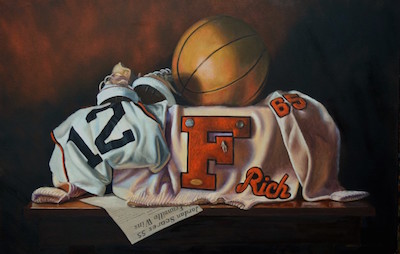
Class C: Reaching Higher
March 22, 2012
EAST LANSING – After falling in the first week of the MHSAA tournament last season, there was no way Traverse City St. Francis was going to look ahead to the end of March this winter.
But riding the bus to Breslin Center on Thursday, the reality of this weekend hit senior Sean Sheldon.
The Gladiators were 32 minutes from reaching their first MHSAA boys basketball Final. And now, they’re only 32 more from winning their first championship.
St. Francis earned that opportunity with 63-54 win over No. 8 Shelby in the second Class C Semifinal. The Gladiators will face Flint Beecher in the noon championship game Saturday.
“Last year, we got out of tournament pretty early. It was a big disappointment for us,” Sheldon said. “We looked ahead a little bit, kinda at what we could do. … Now we’re in the Finals, and now 32 minutes from holding up the first ever state title for our school.”
This was St. Francis’ third Semifinal appearance. The Gladiators (25-2) had never before advanced, losing in their last appearance, in 2006, by 29 points to Saginaw Buena Vista.
St. Francis had high hopes last season. But Elk Rapids ended those abruptly in the District Final.
This time, the Gladiators beat all three of their District opponents by at least 31 points, and two more after that by at least 11 before coming up against Shelby – which was making its first Semifinal appearance since 1972, when Tigers’ longtime coach Rick Zoulek was in middle school.
“In the back of my mind, I was always thinking that was a goal of mine,” said Shelby’s David Beckman, Jr., who with Jeremiah James was a four-year varsity player. “It just happened to be the 50-year anniversary, and we actually made that happen. We had 13 guys make that happen.”
And they nearly advanced to their first Final since that same season.
No matter how much St. Francis surged, Shelby hung around – and took a 45-44 lead with 35 seconds left in the third quarter. The Gladiators held just a one-point lead with 5:58 to play.
“You could feel the momentum coming back our way, and we had a few breaks go against us. A couple mistakes. We missed a couple of shots, a turnover here and there,” Zoulek said. “It was really close. It makes you realize how close you really are to being in that final game. Just a couple of plays.”
Some of them came from Sheldon, who scored six of his 16 points over the final six minutes. The Tigers also made just 4 of 11 shots during that time and had three turnovers. They did well breaking St. Francis’ fullcourt press, but struggled to finish at the other end.
Beckman finished with 17 points and James had 12 points and 11 rebounds for Shelby (24-3).
Three others scored in double figures for St. Francis – senior guard Devin Sheehy led with 18 points (and seven assists), while senior center Michael Jenkins added 14 points and sophomore guard Byron Bullough had 11. Sheldon, who has signed with William & Mary, grabbed a game-high 12 rebounds.
While the basketball championship game is new ground for St. Francis, winning at this level is not—the Gladiators have won six MHSAA football championships over the last 21 seasons.
It’s definitely a football school by reputation. And that success was a big reason basketball coach Keith Haske took the hoops job before 2010-11 after leading multiple Charlevoix teams to Breslin.
“One of the reasons I was excited about going there was because of football. The kids have the mentality they can be state champions,” Haske said. “When I walked in the first day of practice, I had a group of kids who said that because of football, we can be state champs here. That’s a huge factor, and I don’t think people realize that. Because not only do that believe that, but they put the work into it.”
Click for box score or to watch the game and press conferences at MHSAA.tv.
PHOTO: Traverse City St. Francis' Sean Sheldon had 16 points and 12 rebounds in Thursday's Semifinal win. (Photo courtesy of Terry McNamara Photography.

Film Fills In Picture of 'Fennville Flash'
By
Ron Pesch
MHSAA historian
December 28, 2017
We’ve been here before, but not in this way.
The last time was for a retrospective, covering one of the most impressive and awe-inspiring prep careers in Michigan high school history. That time was in print, and included a handful of still images that tried to illustrate the unbelievable.
But this time, the story is in documentary form. It’s woven together from grainy, scratched, faded silent film, a format of capturing memories familiar to thousands of people from generations past, as well as a series of modern-day high-resolution interviews.
Here, the basketball life of the athlete known as the “Fennville Flash” delivers on many levels. Yes, there is a Richie Jordan.
JordanVille, a documentary by John Mooy & Anne Colton, recalls a time when legend spread via word of mouth, newsprint and AM radio.
While it’s hard to comprehend for many today, the exploits of our athletic heroes were formed by “poets in the press box” who sat with pencil and paper, a typewriter, a microphone or a telephone, and described to their audience what they witnessed. On the receiving end, readers and listeners conjured up visualizations based on the facts, phrases and superlatives designed to create an image.
“Traveling left to right on your radio dial” helped listeners feel they were a member of the crowd, seated in the stands, in on the action and a witness to the mayhem. “Packed to the rafters,” reminded fans the importance of what was happening. An exciting game, presented by those with skill, created an event you longed to see. If a broadcast couldn’t be picked up on a transistor or tube radio, the final result might not be known, at the earliest, until the following day’s newspaper arrived.
I’ve told Jordan’s story via the MHSAA before; how he latched on to athletic training, weights and repetition to mold himself into a well-rounded athlete, able to leap to heights unexpected for a kid with a 5-foot-7 frame. The tales of his unfathomable accomplishments slowly leaked beyond the city limits of Fennville into Kalamazoo and greater Southwestern Michigan, then to Detroit. When Detroit Free Press writer Hal Schram relayed Jordan’s feats, the secret traveled across the state and beyond its drawn borders.
From there the legend of Jordan’s accomplishments grew. In Fennville, as in many small towns across the country, the city shut down when a game was played. The Jordan story was so enticing that thousands would travel vast distances to see him play with their own eyes. Today, his single season scoring average of 44.4 points per game during the 1964-65 campaign still remains the top mark in the MHSAA record book.
 JordanVille runs just shy of a half hour. Contained within is insight into the athlete that is challenging to relay in print form. Thanks to access to home movies and a series of interviews with Jordan, former teammates, past opponents and his high school coach, the determination, dedication and drive of a kid who wouldn’t let physical size be a deterrent from achievement radiates from the screen. On display is small town America at its finest, and perspective formed over 50+ years.
JordanVille runs just shy of a half hour. Contained within is insight into the athlete that is challenging to relay in print form. Thanks to access to home movies and a series of interviews with Jordan, former teammates, past opponents and his high school coach, the determination, dedication and drive of a kid who wouldn’t let physical size be a deterrent from achievement radiates from the screen. On display is small town America at its finest, and perspective formed over 50+ years.
For Mooy, it completes a filmmaking journey started six years ago. But the story of Jordan, in his eyes, date back to his school days. Mooy first heard about Jordan as a 7th-grader from a math teacher. A second-team all-St. Joseph Valley League selection, Mooy played at Marcellus High School and scrimmaged against Jordan and the Fennville Blackhawks.
He couldn’t believe his eyes.
“Everyone wanted to see this kid play,” said Mooy in 2011. “He was the first high school player I saw sign an autograph.
Today, with the interviews complete, and the film ready for viewing, Mooy sees more than just a sports story:
“With the benefit of years now passed, I look at the Rich Jordan story with a new respect. JordanVille created a place that was welcoming no matter who you were, or what color your skin happened to be. It was the 1960s. Rich was growing up Jewish, the Civil Rights Movement was in full swing, and the Vietnam War was on everyone's mind. And in Fennville, Michigan, from 1961 to 1965, the Jordan high school years, there were lessons beyond sports being learned by everyone that would last a lifetime. The Jordan household, under the guidance of (his parents) Tuffy and Sylvia Jordan, is where the story begins."
The film speaks of a time that has departed. Competition for our attention was less focused; phones hung on walls or sat on tabletops, communities were tighter, the training table featured peanut butter and chocolate milk instead of protein powder. A city could easily be renamed for a day.
The film also reminds us that those days were far from perfect.
If all goes as planned, the public will see the finished product come the flip of the calendar. In West Michigan, JordanVille is scheduled to show on New Year’s Day at 6 p.m. on WGVU, and will repeat on WGVU-Life at 7:30 p.m., Friday, Jan. 5.
Seek it out, and spread the word, just like in days of old.
 Ron Pesch has taken an active role in researching the history of MHSAA events since 1985 and began writing for MHSAA Finals programs in 1986, adding additional features and "flashbacks" in 1992. He inherited the title of MHSAA historian from the late Dick Kishpaugh following the 1993-94 school year, and resides in Muskegon. Contact him at [email protected] with ideas for historical articles.
Ron Pesch has taken an active role in researching the history of MHSAA events since 1985 and began writing for MHSAA Finals programs in 1986, adding additional features and "flashbacks" in 1992. He inherited the title of MHSAA historian from the late Dick Kishpaugh following the 1993-94 school year, and resides in Muskegon. Contact him at [email protected] with ideas for historical articles.
PHOTOS: (Top) Richie Jordan runs Fennville's offense during his thrilling high school career in the 1960s. (Middle) Jordan memorabilia, as captured by Bill Williams.

